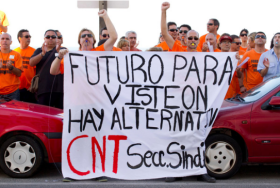450 workers at the Visteon Cadiz Electronica factory are facing the scrapheap. The local section of the CNT union is fighting against the closure of the plant. Other reformist unions inside the plant are engaged in a pantomime struggle, focusing not on saving jobs but simply negotiating over redundancy plans with the bosses. The closure of the plant comes as no surprise: already in 2009, there was a temporary forced adjustment plan which affected almost the entire workforce for six months, and skilled workers were moved to other facilities of the multinational, preparing the ground to continue producing the same car components elsewhere. This follows a pattern which is now well known.
Established in 1997 as a subsidiary of Ford, Visteon has created a network of 40 legally independent companies through which it can outsource work, transfer funds and avoid tax liabilities and its responsibilities towards workers. Ford has been rewarded for its entrepreneurship with state support. This is forest-fire capitalism under the pretence of creating social wealth. The simple logic of outsourcing is to cut costs by stripping-out functions and hawking these out to other firms. These then compete to offer the lowest cost on the basis of squeezing workers even harder than the core employer. In 2005, Ford launched its “Way Forward” plan, which pushed outsourcing into overdrive. Since then, Ford has halved its global workforce, getting over 70,000 workers off its books, by either sacking them or outsourcing the work. Companies are declared bankrupt as a means of avoiding paying redundancy payments and pensions.
This huge international scam also hit the UK in 2009 with the closure of Visteon’s three remaining factories at Enfield, Basildon and Belfast. With minutes’ notice, the workers were sacked without redundancy or pensions. It later emerged that Ford had moved the pension funds prior to the company being declared bankrupt and secret documents with names like “Project Stone”, “Project Protea” and “Project Kennedy” revealed that Visteon UK had detailed long-term plans to close all three factories by reducing the workforce steadily and running them into the ground. In the aftermath of the high profile occupations and direct action, UK workers are now facing a protracted legalistic battle, courtesy of reformist unions such as UNITE.
In response to the attack at Cadiz the CNT union called for an international day of direct action on 18th August. It included communication blockades and phone-ins from across Europe, and a number of informational pickets were also held.
